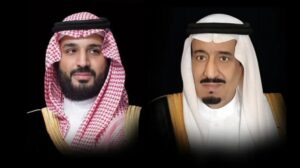King Faisal Prize 2025 Laureates Announced in Riyadh

Riyadh, The Gulf Observer: The King Faisal Prize (KFP) 2025 laureates were unveiled during a ceremony in Riyadh on Wednesday night, honoring exceptional contributions across four categories: Islamic studies, Arabic language and literature, medicine, and science.
Two distinguished professors from King Saud University, a Canadian scientist renowned for advancements in cellular therapy, and a Japanese physicist celebrated for pioneering work in carbon nanotubes, were among the awardees of one of the most prestigious prizes in the Arab world.
Dr. Abdulaziz Alsebail, Secretary-General of the King Faisal Prize, highlighted the rigorous deliberations of the selection committees, which took place from Monday to Wednesday. He noted that the announcement for the fifth category, the King Faisal Prize for Service to Islam, will be made at the end of January.
Islamic Studies: Archaeology in the Arabian Peninsula
The King Faisal Prize for Islamic Studies was jointly awarded to Professor Saad Abdulaziz Alrashid and Professor Said Faiz Alsaid, both esteemed academics from King Saud University.
- Professor Alrashid was recognized for his groundbreaking research on Islamic archaeological sites and inscriptions in the Arabian Peninsula. His work has provided a foundational scientific framework for future research in the field and enriched global understanding of Islamic civilization.
- Professor Alsaid was honored for his innovative studies, which adopt a comparative methodology to analyze inscriptions and ancient writings in the Arabian Peninsula. His research has become a vital reference for understanding the region’s pre-Islamic civilizations and their historical significance.
Arabic Language and Literature
The prize in this category, focused on “Studies of Identity in Arabic Literature,” was withheld this year as the nominated works did not meet the criteria.
Medicine: Cellular Therapy
The King Faisal Prize for Medicine was awarded to Dr. Michel Sadelain, Director of the Center for Cell Engineering at Memorial Sloan Kettering Cancer Center, New York.
- Dr. Sadelain was celebrated for his pioneering contributions to cellular therapy, particularly in the genetic engineering of immune cells with chimeric antigen receptors (CAR-T). His work has revolutionized cancer treatment, offering new hope for patients with blood cancers and potential applications in autoimmune diseases and solid tumors.
Science: Physics
The King Faisal Prize for Science was awarded to Professor Sumio Iijima of Meijo University, Japan.
- Professor Iijima received the award for his pioneering discovery and establishment of carbon nanotubes, a transformative advancement in nanotechnology. His work has significantly impacted physics and material science, enabling innovations across electronics, energy storage, and biomedicine.
History and Legacy
Established in 1977 and first awarded in 1979, the King Faisal Prize has honored nearly 300 laureates for their distinguished contributions to science and global causes. Each recipient is awarded $200,000, a 24-carat gold medal, and a certificate detailing their achievements.
The General Secretariat extended its gratitude to the committees comprising experts, scholars, and specialists from 16 countries for their diligent efforts in selecting this year’s laureates.
The King Faisal Prize continues to uphold its legacy of celebrating excellence and fostering progress in global scientific and cultural endeavors.


